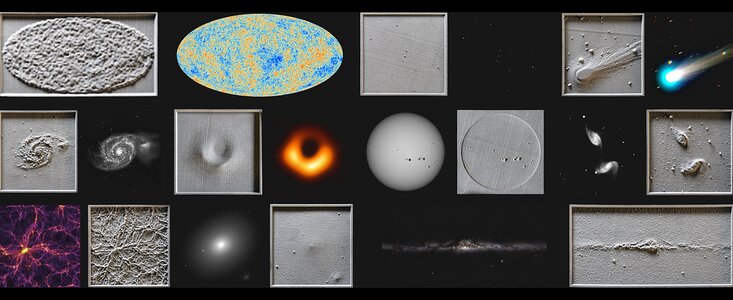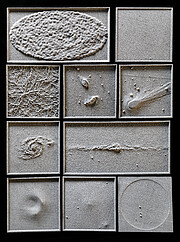Announcement
A Dark Tour of the Universe
ESO Fellow Leads Astronomy Show for the Blind and Visually Impaired
13 September 2019
ESO Fellow Chris Harrison has led a project to design and produce an astronomical show aimed at people who are blind or visually impaired. A Dark Tour of the Universe offers a tactile experience of the Universe by using 3D models of astronomical images and sonification of real astronomical datasets. The show premieres at the British Science Festival on 13 September 2019.
The show starts with stars appearing as they are from the platform of ESO’s Very Large Telescope in Chile, on the night of 13 September 2019. Using real data of position, magnitudes and colours of stars, a beautiful surround-sound effect is created, allowing the audience to listen to the stars appear.
Other highlights of the show include listening to variable stars and to galaxies merging, and feeling 3D models of some of ESO’s best astronomical images, including the first picture of a black hole and the 360-degree panoramic image of the Milky Way, taken by our Photo Ambassador Serge Brunier. One of the datasets that has been sonified is related to the discovery of exoplanet NGTS-1b, using the Next Generation Transit Survey (NGTS) instrument at ESO’s Paranal Observatory. NGTS-1b was the third gas giant to be observed transiting an M-dwarf star.
People who have sight are also encouraged to attend the show. They will gain a lot from the experience, as they will be blindfolded.
The project, in collaboration with BMW, has been shortlisted for the prestigious industrial TCT awards, which are celebrating the innovators, technologies and collaborators behind the leading examples of additive manufacturing, 3D printing, design and engineering across the globe. The awards ceremony will take place on 25 September 2019.
The project was led by ESO Fellow Chris Harrison, who worked with various astronomers at ESO, including other fellows and students. Chris built upon his experience of producing planetarium shows for the ESO Supernova as part of his fellow duties, while conducting research at ESO Headquarters in Garching near Munich.
The show was produced together with Nicolas Bonne, a visually impaired astronomer from the University of Portsmouth and Tactile Universe, who brought valuable experience on how visually impaired astronomers conduct their research. He has also turned images into 3D models and is the presenter of the show.
German company BMW printed 300 3D models for the show, while global engineering company Arup used their acoustic-consulting team and Sydney-based SoundLab to produce sonified astrophysics concepts and data and created a soundtrack using full surround sound (6.1). Arup’s UK Midlands office provided the technical support required for the premiere showing at the British Science Festival.
James Reevell, a UK musician and teacher, created all of the music and “composer’s impressions” for the show. He used an ESO-produced simulation movie of a black hole as inspiration for one of his compositions.
Audio files
A — Listen to the stars appear at ESO’s Paranal Observatory in Chile
This sonified material allows the audience to listen to the stars appear as they did on 13 September 2019 at ESO’s Very Large Telescope in Chile. The sounds heard represent each star (brightest stars appear first) and the pitch of the sound represents the colour of the star. Time has been sped up. The position of the star in the surround sound systems is also tied to the real position on the night sky. However, the audio file has been modified from full surround sound (6.1) to stereo. This material is part of the A Dark Tour of the Universe astronomy show for the blind and visually impaired.
Credit: Mitchell Allen/Kim Jones (Arup); Chris Harrison/Miranda Jarvis (ESO)
B — Listen to a Cataclysmic Variable star
Some stars are very variable and have huge changes in brightness as they flare up. This sonified material allows the audience to listen to a Cataclysmic Variable star (V344 Lyr) that shows both short, low-amplitude (lasting for approximately 5 days) and long, large-amplitude (lasting for approximately 15 days) outbursts. The data were taken from NASA’s Kepler mission that tracks how the star varies in brightness through time. This material is part of the A Dark Tour of the Universe astronomy show for the blind and visually impaired, but it has been modified from full surround sound (6.1) to stereo.
Credit: Mitchell Allen and Kim Jones (Arup); Chris Harrison (ESO); Kepler Space Telescope data
C — Listen to galaxies merge
Over a timespan of millions to billions of years galaxies can attract each other and subsequently collide or merge. The Milky Way galaxy will eventually collide with the Andromeda galaxy. Although we can not watch this process in real galaxies because it takes too long, we can create a simulation in a computer to speed up time. This sonified material allows the audience to listen to two galaxies merging, and the surround sound enables them to hear the galaxies approach from each side and orbit around each other before finally merging together. This material is part of the A Dark Tour of the Universe astronomy show for the blind and visually impaired, but it has been modified from full surround sound (6.1) to stereo.
Credit: Mitchell Allen/Kim Jones (Arup); Chris Harrison (ESO); Florent Renaud (Lund Observatory)
Links
- British Science Festival
- Chris Harrison
- Nicolas Bonne
- Tactile Universe
- BMW
- Arup
- James Reevell
- TCT awards
Contacts
Oana Sandu
Community Coordinator & Communication Strategy Officer
ESO Department of Communication
Tel: +49 89 320 069 65
Email: osandu@partner.eso.org
About the Announcement
| Id: | ann19045 |
Our use of Cookies
We use cookies that are essential for accessing our websites and using our services. We also use cookies to analyse, measure and improve our websites’ performance, to enable content sharing via social media and to display media content hosted on third-party platforms.
ESO Cookies Policy
The European Organisation for Astronomical Research in the Southern Hemisphere (ESO) is the pre-eminent intergovernmental science and technology organisation in astronomy. It carries out an ambitious programme focused on the design, construction and operation of powerful ground-based observing facilities for astronomy.
This Cookies Policy is intended to provide clarity by outlining the cookies used on the ESO public websites, their functions, the options you have for controlling them, and the ways you can contact us for additional details.
What are cookies?
Cookies are small pieces of data stored on your device by websites you visit. They serve various purposes, such as remembering login credentials and preferences and enhance your browsing experience.
Categories of cookies we use
Essential cookies (always active): These cookies are strictly necessary for the proper functioning of our website. Without these cookies, the website cannot operate correctly, and certain services, such as logging in or accessing secure areas, may not be available; because they are essential for the website’s operation, they cannot be disabled.
Functional Cookies: These cookies enhance your browsing experience by enabling additional features and personalization, such as remembering your preferences and settings. While not strictly necessary for the website to function, they improve usability and convenience; these cookies are only placed if you provide your consent.
Analytics cookies: These cookies collect information about how visitors interact with our website, such as which pages are visited most often and how users navigate the site. This data helps us improve website performance, optimize content, and enhance the user experience; these cookies are only placed if you provide your consent. We use the following analytics cookies.
Matomo Cookies:
This website uses Matomo (formerly Piwik), an open source software which enables the statistical analysis of website visits. Matomo uses cookies (text files) which are saved on your computer and which allow us to analyze how you use our website. The website user information generated by the cookies will only be saved on the servers of our IT Department. We use this information to analyze www.eso.org visits and to prepare reports on website activities. These data will not be disclosed to third parties.
On behalf of ESO, Matomo will use this information for the purpose of evaluating your use of the website, compiling reports on website activity and providing other services relating to website activity and internet usage.
Matomo cookies settings:
Additional Third-party cookies on ESO websites: some of our pages display content from external providers, e.g. YouTube.
Such third-party services are outside of ESO control and may, at any time, change their terms of service, use of cookies, etc.
YouTube: Some videos on the ESO website are embedded from ESO’s official YouTube channel. We have enabled YouTube’s privacy-enhanced mode, meaning that no cookies are set unless the user actively clicks on the video to play it. Additionally, in this mode, YouTube does not store any personally identifiable cookie data for embedded video playbacks. For more details, please refer to YouTube’s embedding videos information page.
Cookies can also be classified based on the following elements.
Regarding the domain, there are:
- First-party cookies, set by the website you are currently visiting. They are stored by the same domain that you are browsing and are used to enhance your experience on that site;
- Third-party cookies, set by a domain other than the one you are currently visiting.
As for their duration, cookies can be:
- Browser-session cookies, which are deleted when the user closes the browser;
- Stored cookies, which stay on the user's device for a predetermined period of time.
How to manage cookies
Cookie settings: You can modify your cookie choices for the ESO webpages at any time by clicking on the link Cookie settings at the bottom of any page.
In your browser: If you wish to delete cookies or instruct your browser to delete or block cookies by default, please visit the help pages of your browser:
Please be aware that if you delete or decline cookies, certain functionalities of our website may be not be available and your browsing experience may be affected.
You can set most browsers to prevent any cookies being placed on your device, but you may then have to manually adjust some preferences every time you visit a site/page. And some services and functionalities may not work properly at all (e.g. profile logging-in, shop check out).
Updates to the ESO Cookies Policy
The ESO Cookies Policy may be subject to future updates, which will be made available on this page.
Additional information
For any queries related to cookies, please contact: pdprATesoDOTorg.
As ESO public webpages are managed by our Department of Communication, your questions will be dealt with the support of the said Department.


